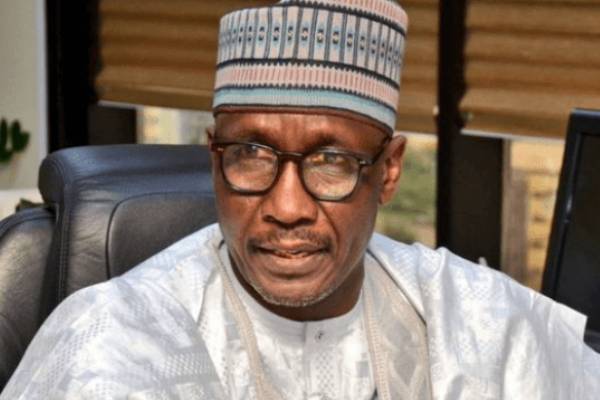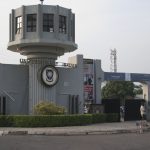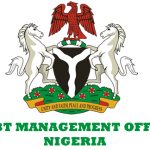Nigeria’s fuel importation woes may end mid-next year when the Dangote refineries are completed and the federal government also restores the existing government-owned refineries to 90 percent installed capacity.
This was disclosed by the group chief executive officer of the Nigeria National Petroleum limited at the 49th session of the state house briefing organized by the presidential communications team at the presidential villa.
He also said the country currently loses about 700 thousand barrels of crude oil to theft and pipeline vandalism.
This time, the Nigeria National Petroleum Company Limited has a somewhat realistic timeline on when fuel importation into the country will end.
Fuel importation has been the government’s only option to meet domestic consumption.
But Mele Kyari, the group chief Executive officer of the NNPC believes the much-anticipated completion of the Dangote refinery will complement the output from the rehabilitated government-owned refineries.
Nigeria is the only member country of the Organisation of Petroleum Exporting Countries that lacks domestic refining capacity.
In March last year, President Buhari approved $1.5 billion for the repairs of portharcourt refinery,
The house of representatives is also probing claims that more than $25 billion dollars have been spent on repairing refineries in the past 25 years with no profitable outcome.
Mele Kyari says NNPC is in the process of restoring the portharcourt and Warri refinery to 90 percent installed capacity.
It seems the biggest headache for the NNPC is crude oil theft, The CEO of Nigeria’s Oil company puts the loss incurred daily at 700 thousand barrels, with 1 billion dollars lost in revenue in the first quarter of this year alone.
The signing of the Petroleum industry act by president Muhammadu Buhari has now provided a governing structure for the Oil and Gas sector and enabled the NNPC’s transition to a commercial oil company, limited by shares.
Hopefully, this will translate into improved crude oil production and increased revenue generation.
Nigeria’s fuel importation woes may end mid-next year when the Dangote refineries are completed and the federal government also restores the existing government-owned refineries to 90 percent installed capacity.
This was disclosed by the group chief executive officer of the Nigeria National Petroleum limited at the 49th session of the state house briefing organized by the presidential communications team at the presidential villa.
He also said the country currently loses about 700 thousand barrels of crude oil to theft and pipeline vandalism.
This time, the Nigeria National Petroleum Company Limited has a somewhat realistic timeline on when fuel importation into the country will end.
Fuel importation has been the government’s only option to meet domestic consumption.
But Mele Kyari, the group chief Executive officer of the NNPC believes the much-anticipated completion of the Dangote refinery will complement the output from the rehabilitated government-owned refineries.
Nigeria is the only member country of the Organisation of Petroleum Exporting Countries that lacks domestic refining capacity.
In March last year, President Buhari approved $1.5 billion for the repairs of portharcourt refinery,
The house of representatives is also probing claims that more than $25 billion dollars have been spent on repairing refineries in the past 25 years with no profitable outcome.
Mele Kyari says NNPC is in the process of restoring the portharcourt and Warri refinery to 90 percent installed capacity.
It seems the biggest headache for the NNPC is crude oil theft, The CEO of Nigeria’s Oil company puts the loss incurred daily at 700 thousand barrels, with 1 billion dollars lost in revenue in the first quarter of this year alone.
The signing of the Petroleum industry act by president Muhammadu Buhari has now provided a governing structure for the Oil and Gas sector and enabled the NNPC’s transition to a commercial oil company, limited by shares.
Hopefully, this will translate into improved crude oil production and increased revenue generation.
Nigeria’s fuel importation woes may end mid-next year when the Dangote refineries are completed and the federal government also restores the existing government-owned refineries to 90 percent installed capacity.
This was disclosed by the group chief executive officer of the Nigeria National Petroleum limited at the 49th session of the state house briefing organized by the presidential communications team at the presidential villa.
He also said the country currently loses about 700 thousand barrels of crude oil to theft and pipeline vandalism.
This time, the Nigeria National Petroleum Company Limited has a somewhat realistic timeline on when fuel importation into the country will end.
Fuel importation has been the government’s only option to meet domestic consumption.
But Mele Kyari, the group chief Executive officer of the NNPC believes the much-anticipated completion of the Dangote refinery will complement the output from the rehabilitated government-owned refineries.
Nigeria is the only member country of the Organisation of Petroleum Exporting Countries that lacks domestic refining capacity.
In March last year, President Buhari approved $1.5 billion for the repairs of portharcourt refinery,
The house of representatives is also probing claims that more than $25 billion dollars have been spent on repairing refineries in the past 25 years with no profitable outcome.
Mele Kyari says NNPC is in the process of restoring the portharcourt and Warri refinery to 90 percent installed capacity.
It seems the biggest headache for the NNPC is crude oil theft, The CEO of Nigeria’s Oil company puts the loss incurred daily at 700 thousand barrels, with 1 billion dollars lost in revenue in the first quarter of this year alone.
The signing of the Petroleum industry act by president Muhammadu Buhari has now provided a governing structure for the Oil and Gas sector and enabled the NNPC’s transition to a commercial oil company, limited by shares.
Hopefully, this will translate into improved crude oil production and increased revenue generation.
Nigeria’s fuel importation woes may end mid-next year when the Dangote refineries are completed and the federal government also restores the existing government-owned refineries to 90 percent installed capacity.
This was disclosed by the group chief executive officer of the Nigeria National Petroleum limited at the 49th session of the state house briefing organized by the presidential communications team at the presidential villa.
He also said the country currently loses about 700 thousand barrels of crude oil to theft and pipeline vandalism.
This time, the Nigeria National Petroleum Company Limited has a somewhat realistic timeline on when fuel importation into the country will end.
Fuel importation has been the government’s only option to meet domestic consumption.
But Mele Kyari, the group chief Executive officer of the NNPC believes the much-anticipated completion of the Dangote refinery will complement the output from the rehabilitated government-owned refineries.
Nigeria is the only member country of the Organisation of Petroleum Exporting Countries that lacks domestic refining capacity.
In March last year, President Buhari approved $1.5 billion for the repairs of portharcourt refinery,
The house of representatives is also probing claims that more than $25 billion dollars have been spent on repairing refineries in the past 25 years with no profitable outcome.
Mele Kyari says NNPC is in the process of restoring the portharcourt and Warri refinery to 90 percent installed capacity.
It seems the biggest headache for the NNPC is crude oil theft, The CEO of Nigeria’s Oil company puts the loss incurred daily at 700 thousand barrels, with 1 billion dollars lost in revenue in the first quarter of this year alone.
The signing of the Petroleum industry act by president Muhammadu Buhari has now provided a governing structure for the Oil and Gas sector and enabled the NNPC’s transition to a commercial oil company, limited by shares.
Hopefully, this will translate into improved crude oil production and increased revenue generation.
Nigeria’s fuel importation woes may end mid-next year when the Dangote refineries are completed and the federal government also restores the existing government-owned refineries to 90 percent installed capacity.
This was disclosed by the group chief executive officer of the Nigeria National Petroleum limited at the 49th session of the state house briefing organized by the presidential communications team at the presidential villa.
He also said the country currently loses about 700 thousand barrels of crude oil to theft and pipeline vandalism.
This time, the Nigeria National Petroleum Company Limited has a somewhat realistic timeline on when fuel importation into the country will end.
Fuel importation has been the government’s only option to meet domestic consumption.
But Mele Kyari, the group chief Executive officer of the NNPC believes the much-anticipated completion of the Dangote refinery will complement the output from the rehabilitated government-owned refineries.
Nigeria is the only member country of the Organisation of Petroleum Exporting Countries that lacks domestic refining capacity.
In March last year, President Buhari approved $1.5 billion for the repairs of portharcourt refinery,
The house of representatives is also probing claims that more than $25 billion dollars have been spent on repairing refineries in the past 25 years with no profitable outcome.
Mele Kyari says NNPC is in the process of restoring the portharcourt and Warri refinery to 90 percent installed capacity.
It seems the biggest headache for the NNPC is crude oil theft, The CEO of Nigeria’s Oil company puts the loss incurred daily at 700 thousand barrels, with 1 billion dollars lost in revenue in the first quarter of this year alone.
The signing of the Petroleum industry act by president Muhammadu Buhari has now provided a governing structure for the Oil and Gas sector and enabled the NNPC’s transition to a commercial oil company, limited by shares.
Hopefully, this will translate into improved crude oil production and increased revenue generation.
Nigeria’s fuel importation woes may end mid-next year when the Dangote refineries are completed and the federal government also restores the existing government-owned refineries to 90 percent installed capacity.
This was disclosed by the group chief executive officer of the Nigeria National Petroleum limited at the 49th session of the state house briefing organized by the presidential communications team at the presidential villa.
He also said the country currently loses about 700 thousand barrels of crude oil to theft and pipeline vandalism.
This time, the Nigeria National Petroleum Company Limited has a somewhat realistic timeline on when fuel importation into the country will end.
Fuel importation has been the government’s only option to meet domestic consumption.
But Mele Kyari, the group chief Executive officer of the NNPC believes the much-anticipated completion of the Dangote refinery will complement the output from the rehabilitated government-owned refineries.
Nigeria is the only member country of the Organisation of Petroleum Exporting Countries that lacks domestic refining capacity.
In March last year, President Buhari approved $1.5 billion for the repairs of portharcourt refinery,
The house of representatives is also probing claims that more than $25 billion dollars have been spent on repairing refineries in the past 25 years with no profitable outcome.
Mele Kyari says NNPC is in the process of restoring the portharcourt and Warri refinery to 90 percent installed capacity.
It seems the biggest headache for the NNPC is crude oil theft, The CEO of Nigeria’s Oil company puts the loss incurred daily at 700 thousand barrels, with 1 billion dollars lost in revenue in the first quarter of this year alone.
The signing of the Petroleum industry act by president Muhammadu Buhari has now provided a governing structure for the Oil and Gas sector and enabled the NNPC’s transition to a commercial oil company, limited by shares.
Hopefully, this will translate into improved crude oil production and increased revenue generation.
Nigeria’s fuel importation woes may end mid-next year when the Dangote refineries are completed and the federal government also restores the existing government-owned refineries to 90 percent installed capacity.
This was disclosed by the group chief executive officer of the Nigeria National Petroleum limited at the 49th session of the state house briefing organized by the presidential communications team at the presidential villa.
He also said the country currently loses about 700 thousand barrels of crude oil to theft and pipeline vandalism.
This time, the Nigeria National Petroleum Company Limited has a somewhat realistic timeline on when fuel importation into the country will end.
Fuel importation has been the government’s only option to meet domestic consumption.
But Mele Kyari, the group chief Executive officer of the NNPC believes the much-anticipated completion of the Dangote refinery will complement the output from the rehabilitated government-owned refineries.
Nigeria is the only member country of the Organisation of Petroleum Exporting Countries that lacks domestic refining capacity.
In March last year, President Buhari approved $1.5 billion for the repairs of portharcourt refinery,
The house of representatives is also probing claims that more than $25 billion dollars have been spent on repairing refineries in the past 25 years with no profitable outcome.
Mele Kyari says NNPC is in the process of restoring the portharcourt and Warri refinery to 90 percent installed capacity.
It seems the biggest headache for the NNPC is crude oil theft, The CEO of Nigeria’s Oil company puts the loss incurred daily at 700 thousand barrels, with 1 billion dollars lost in revenue in the first quarter of this year alone.
The signing of the Petroleum industry act by president Muhammadu Buhari has now provided a governing structure for the Oil and Gas sector and enabled the NNPC’s transition to a commercial oil company, limited by shares.
Hopefully, this will translate into improved crude oil production and increased revenue generation.
Nigeria’s fuel importation woes may end mid-next year when the Dangote refineries are completed and the federal government also restores the existing government-owned refineries to 90 percent installed capacity.
This was disclosed by the group chief executive officer of the Nigeria National Petroleum limited at the 49th session of the state house briefing organized by the presidential communications team at the presidential villa.
He also said the country currently loses about 700 thousand barrels of crude oil to theft and pipeline vandalism.
This time, the Nigeria National Petroleum Company Limited has a somewhat realistic timeline on when fuel importation into the country will end.
Fuel importation has been the government’s only option to meet domestic consumption.
But Mele Kyari, the group chief Executive officer of the NNPC believes the much-anticipated completion of the Dangote refinery will complement the output from the rehabilitated government-owned refineries.
Nigeria is the only member country of the Organisation of Petroleum Exporting Countries that lacks domestic refining capacity.
In March last year, President Buhari approved $1.5 billion for the repairs of portharcourt refinery,
The house of representatives is also probing claims that more than $25 billion dollars have been spent on repairing refineries in the past 25 years with no profitable outcome.
Mele Kyari says NNPC is in the process of restoring the portharcourt and Warri refinery to 90 percent installed capacity.
It seems the biggest headache for the NNPC is crude oil theft, The CEO of Nigeria’s Oil company puts the loss incurred daily at 700 thousand barrels, with 1 billion dollars lost in revenue in the first quarter of this year alone.
The signing of the Petroleum industry act by president Muhammadu Buhari has now provided a governing structure for the Oil and Gas sector and enabled the NNPC’s transition to a commercial oil company, limited by shares.
Hopefully, this will translate into improved crude oil production and increased revenue generation.














